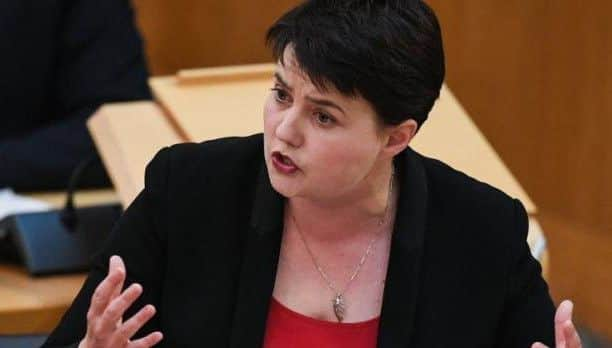Will Scottish Tories rebel over constitutional crisis?
Nicola Sturgeon has said that the prospect of MSPs withholding ‘legislative consent’ for the bill makes a second referendum on independence seem ‘irresistible’.
The SNP has been accused of looking to exploit Brexit for their own constitutional aims, but there is no doubt that a crisis is looming over the current legislative stand-off.
Advertisement
Hide AdAdvertisement
Hide AdSignificantly, there was unanimity on the committee, with the three Conservative MSPs agreeing with the conclusion of the SNP’s Bruce Crawford that there was still work to be done on the bill going through parliament.


With 13 new Tory MPs in Westminster, and the party the second largest party in Holyrood, there is potential for the Scottish party to disrupt Theresa May’s Brexit plans if they are minded to. But are they?
MSPs
If a large majority of MSPs vote against legislative consent, it isn’t enough to stop Brexit, but is a telling signal for the Scottish Parliament to send.


If Conservative MSPs can be persuaded to vote against legislative consent for the EU Withdrawal Bill, that signal becomes even more stark.
A unanimous vote of MSPs carries far more weight than simply a unanimous committee vote, although we are a long way from the final shape of the bill becoming apparent.
‘Clause 11’, which deals with devolved powers in the bill, will now not be amended in the House of Commons as we revealed exclusively yesterday.
It will now be hammered out in the House of Lords, freezing out the 13 Scottish Conservative MPs, at least in legislative terms.
That will leave them with a potentially big decision on whether to rebel on some of the Government’s Brexit plans.
MPs
Advertisement
Hide AdAdvertisement
Hide AdChancellor Philip Hammond went out of his way during the Autumn Budget to praise the new bloc of Scottish Tory MPs for their strength as a negotiating team.
That was a none-too-subtle political move to ensure the Scottish party could draw a distinction between their more collegiate approach and what they portray as the antagonistic stance of the SNP MPs.
That approach could be in jeopardy after David Mundell broke his pledge to ensure Clause 11 was amended before the bill went to the House of Lords.
It would appear to be a failure of communication between the Scottish Secretary and his new colleagues, as it is believed that Tory MPs first learned of the missed deadline for amending Clause 11 in the press.
While they might not be set to defy the Government as a group, one MP has shown a streak of independence that could see him become a potential rebel.
Paul Masterton, who was elected in Jim Murphy’s old seat of East Renfrewshire, which voted 74 per cent Remain, was even labelled a ‘mutineer’ by the right-wing newspaper The Telegraph.
Given he was the one to seek (and receive) the guarantee from David Mundell on Clause 11, he will need to be won over on the delay to amending the bill, and the contents of Clause 11.
The Leader
As Theresa May’s position as Prime Minister remains precarious (arguably more so after her abortive reshuffle this week), all eyes are on potential Tory leadership contenders.
Advertisement
Hide AdAdvertisement
Hide AdWith Scottish Conservative leader Ruth Davidson fourth-favourite in the betting for that position, her every statement and stance is scrutinised for potentially revealing ambitions for higher office.
Ms Davidson insists the only office she craves for now is that of First Minister Nicola Sturgeon, but she has huge influence over the Scottish Conservative MPs her high-profile and campaigning nous helped elect in June.
She will be keen not to give an edge to the SNP by appearing to back anything like their anti-Brexit stance, but her future political ambitions could rely on being seen as the voice of soft-Brexit Conservatives.
Despite the missed deadline, however, the Scottish Conservatives might not be keen to rebel so soon after they boosted their numbers in the House of Commons.
But they are certainly learning, as the SNP did before them, that being in Government in one parliament while being the opposition in another is a political tightrope.